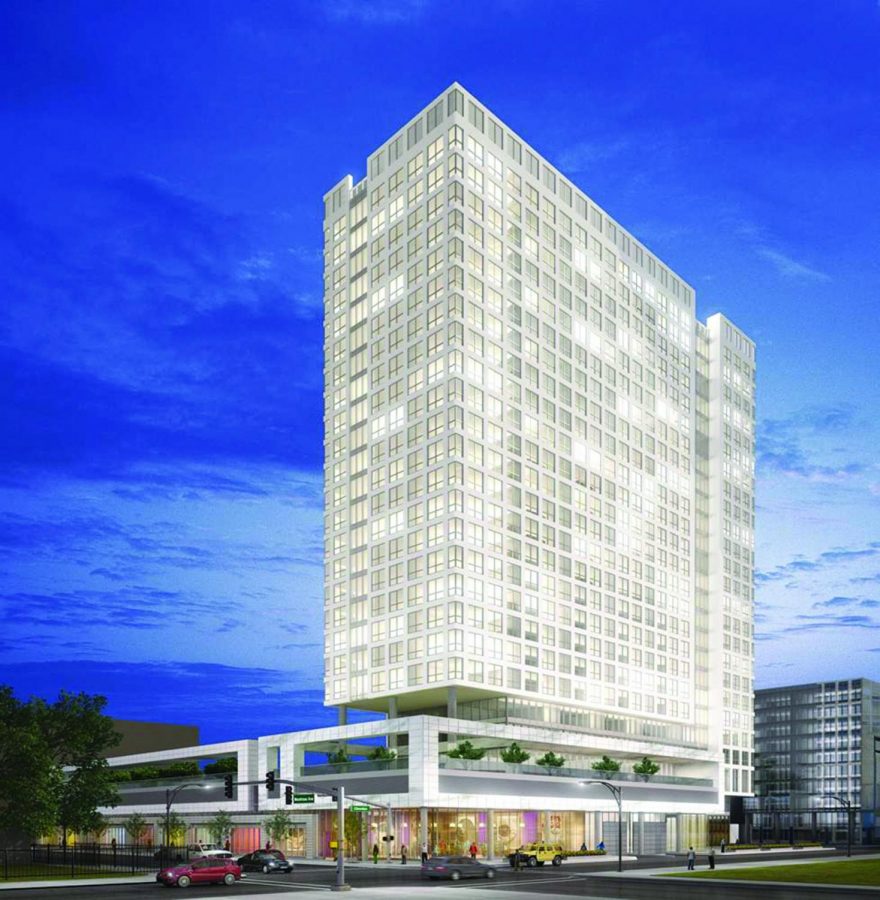Uptown residents: new apartments will gentrify neighborhood
» Courtesy Montrose Clarendon Partners LLC
This 381 residential unit building was proposed to be built at 4400 N. Clarendon Ave. with approximately 31,000 square feet of commercial space.
February 16, 2016
Preliminary approval for zoning and financial assistance for a mixed-income apartment complex has sparked protests from residents in the Uptown neighborhood who cite a lack of housing and assistance for the poor and homeless.
The Chicago Plan Commission and Community Development Commission approved zoning and financial assistance for the Montrose/Clarendon project, proposed for a site at 4400 N. Clarendon Ave. Many residents have expressed disapproval of the plan, claiming it would not provide enough affordable housing.
City documents refer to the project as mixed-income housing, and the proposed 381 residential units feature 20 affordable units. The apartments are considered affordable for people earning 50–60 percent of the area’s median income, which according to City of Chicago Uptown census data, income is $35,787.
“I don’t understand how so many people can fall through the cracks when there’s an abundance of resources,” said Uptown resident Lee Fossett, who said she is concerned about the lack of resources for the poor
and homeless.
The development comes after protests in 2015 calling for better aid to the neighborhood’s homeless population, as reported by The Chronicle on Nov. 16, 2015.
According to city documents, the developer Montrose-Clarendon Partners LLC, would contribute $5.7 million to the City’s Affordable Housing Fund, of which half would be used for rental subsidies for extremely low-income residents. The other half would be used for construction and rehabilitation of affordable housing for seniors, veterans and other people with special needs.
Glen van Alkemade, a member of Jesus People USA, an organization he said advocates for the rights of the poor, operates one of the largest homeless shelters on the North Side and sits on Alderman James Cappleman’s (46th Ward) planning committee. He feels conflicted about the project.
“In the existing political climate, it’s the best development we could hope for; in a different political climate I would hope for much better,” van Alkemade said. “I perceive a lack of commitment from our alderman and our mayor to genuinely serve the needs of the poorest citizens of Chicago.”
Cappleman could not be reached for comment as of press time, despite multiple attempts to contact him.
According to city documents, the proposed project’s total cost is estimated at $125 million. About $15. 8 million will come from Tax Increment Financing- money that is pooled from a certain area’s property taxes. However, since Uptown does not contain enough buildings generating money in the TIF district, so the TIF increment to assist the project will be generated by the project itself, according to city documents.
Jeffrey Littleton, who also sits on the alderman’s planning committee, said while Uptown is almost completely gentrified, the ward still has some remaining low-income housing, but that is shrinking.
The staff report to the Community Development Commission requesting developer designation states that the lowest price for one of the 20 affordable housing units would be about $636 per month for a studio, with the most expensive being a two bedroom priced at $980 monthly. Of the 353 market rate units, prices range from a studio with a monthly rent of $1,688 and a two-bedroom for $2,637.
Littleton said more affordable housing has been “cleaned out” and more people are becoming homeless. He said the complex is subsidized gentrification.
According to city documents, the TIF assistance and zoning proposals require City Council approval, and both will be heard at committee hearings in the spring of 2016.
The project would also provide about 650 construction jobs, 60 permanent jobs and generate $3 million in annual property and sales tax, according to city documents.
“Anyone in a position of power needs to really be careful about who they’re serving,” Fossett said. “[They] have to represent everybody and not cater to the rich.”
Steven Corey, interim dean of the School of Liberal Arts & Sciences and a professor of history, said gentrification is part of the cycle of neighborhood.
“Gentrification isn’t anything new and it’s sort of what defines an urban area… neighborhoods are always changing. Sometimes the change happens quickly and sometimes the change happens over a long period of time,” Corey said. “If it happens over a long period of time [it is] less controversial but if it happens quickly that’s where you see the ‘flash point’ if you will and that can really be dramatic, especially if you’re dealing with vulnerable population.”
* An earlier version of this story stated that the TIF money used to fund the project would come from other districts. That statement has been corrected to say that the TIF money will be generated by the project itself.








